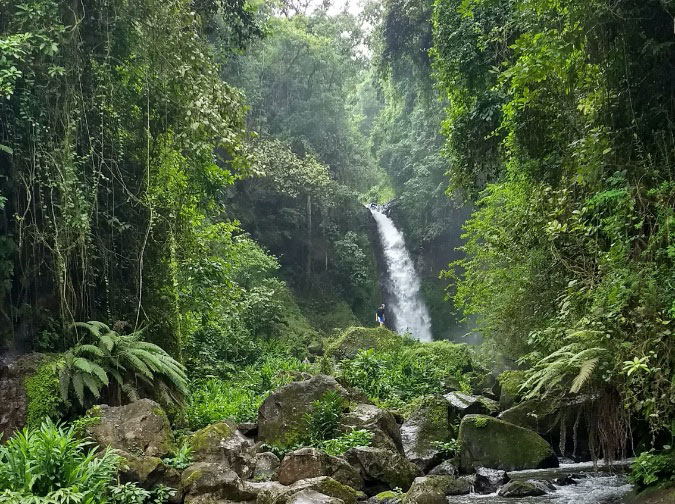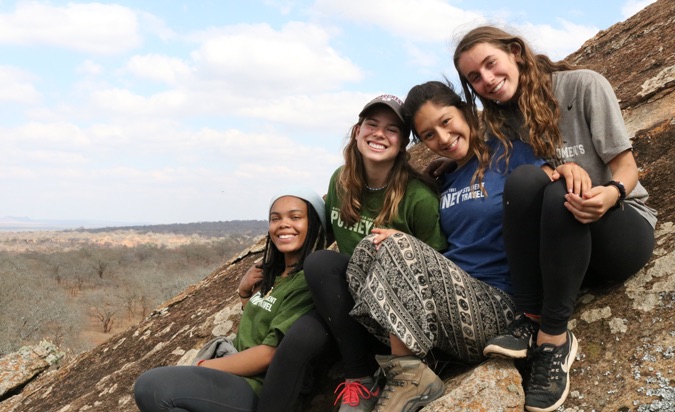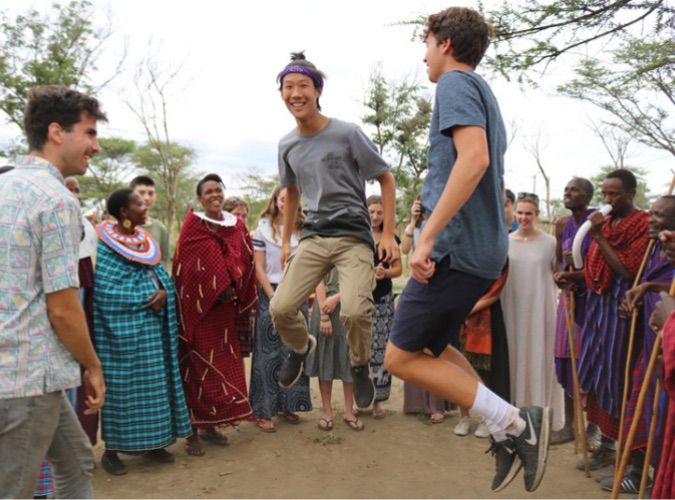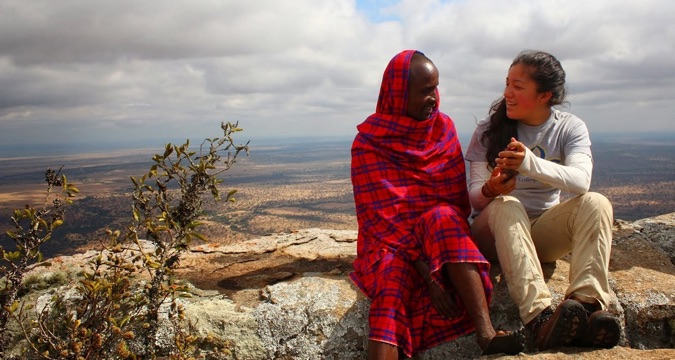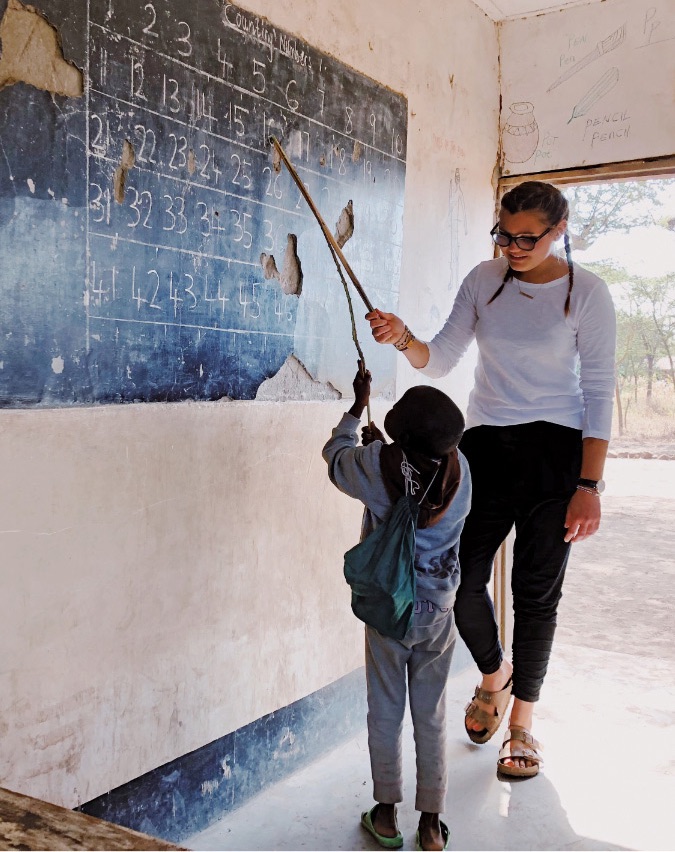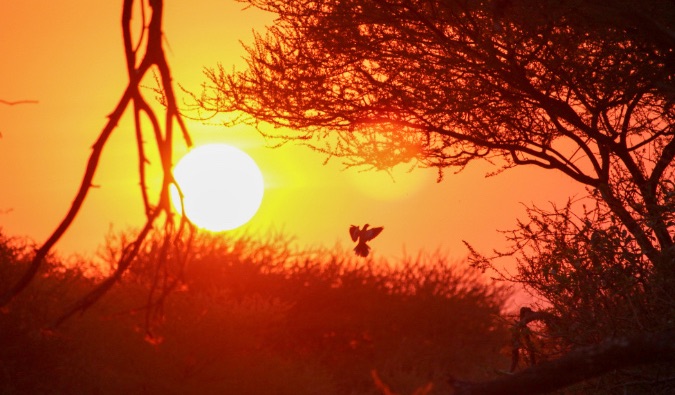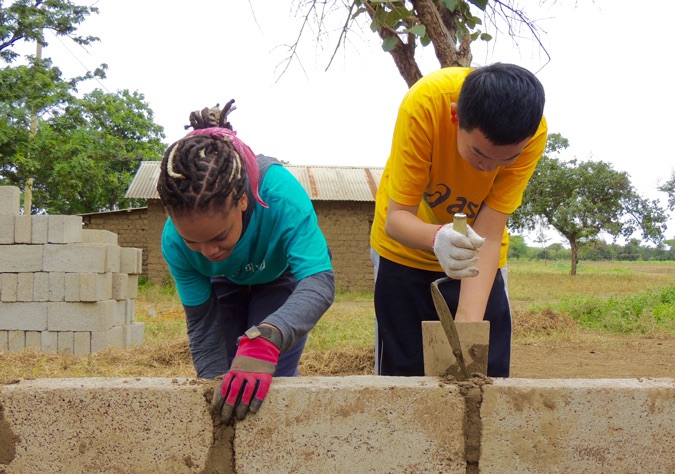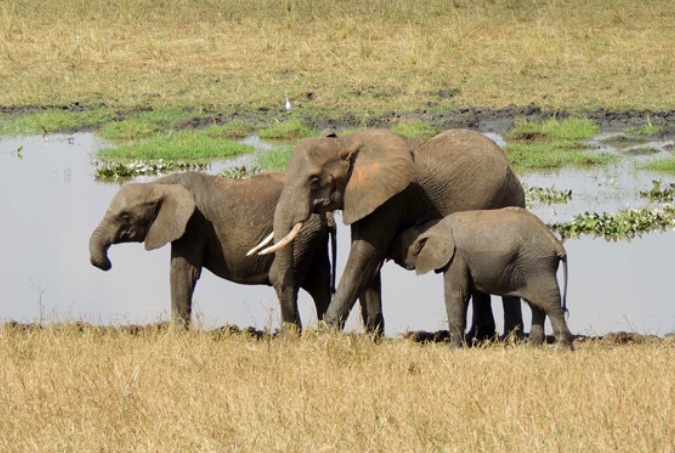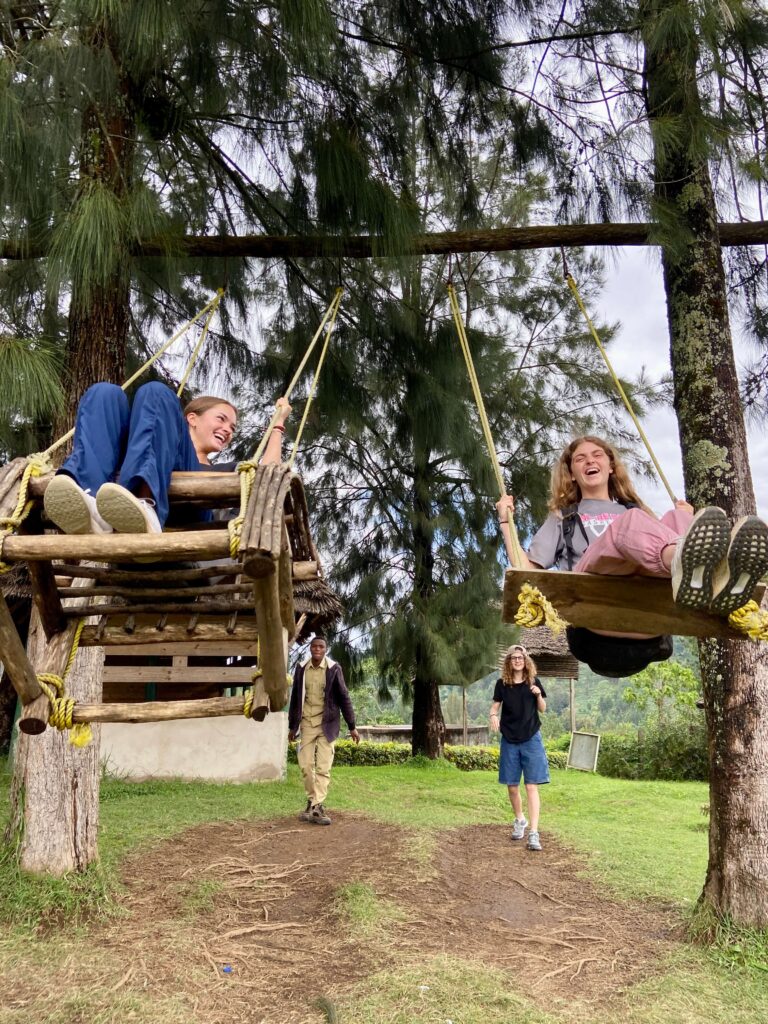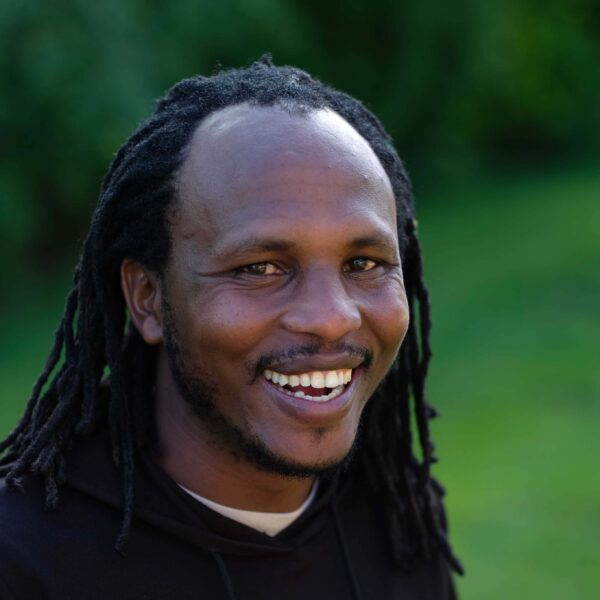Tanzania
Service, Swahili, & Safari
Immerse yourself in village life in Tanzania as you join community members to volunteer on several locally directed service projects. Collaborate on small-scale construction projects and teach English and math to local school children. On your final week abroad, venture out on a specially designed safari that combines a brief introduction to life at a rural Maasai boma with world-class wildlife viewing in Ngorongoro Crater and Tarangire National Park, directed by professional guides and game-finders.
- Highlights
• Teach English lessons for Tanzanian school children
• Visit a Maasai boma and walk amongst baobabs
• Explore the 10-mile-wide Ngorongoro Crater big game park
Itinerary
This itinerary represents our best projection of the group’s schedule. However, we may implement changes designed to improve the quality of the program.
Meet your fellow high school student travelers and one or more of your leaders in New York, and fly together to Arusha, Tanzania. To learn more about how we organize travel, click here.
Collaborate with local people and undertake several meaningful community service projects in our host village on the lower slope of Mt. Meru, near Tanzania’s northeastern hub of Arusha. Rise early and dive into small groups on the service project sites. You may build a classroom, school kitchen, or simple housing for teachers; teach math or English to local children; improve the village water supply system; or work on local farms planting and harvesting crops. Late afternoons are devoted to group activities with our Tanzanian friends: play soccer, go for a hike, take Swahili lessons, attend a workshop to learn batik artwork or beading, or work on your independent project.
Stay at a mountain lodge at the foot of Mt. Kilimanjaro. Learn about the people, cultures, and history of the Kilimanjaro region, and explore the area’s waterfalls and dramatic rain-forested landscape.
Return to your host village and continue work on service projects. Further explore the local area on visits to nearby markets, coffee farms, or an ecotourism project site. In your final days, join your new Tanzanian friends in a farewell celebration of stories, songs, dance, and final lasting memories.
Head out on a safari organized by close friends of Putney, who introduce us to Tanzania’s fascinating tribal culture, wildlife, and history. Begin at Randilen, a community-owned wildlife management area on the outskirts of Tarangire National Park that is protected by the Maasai for the benefit of both people and wildlife. Camp on these traditional hunting lands as guests of the Maasai and, along with our professional safari guides, explore Randilen’s baobab woodlands on foot. In the world-renowned Tarangire National Park, view Tanzania’s iconic big game animals up close from the safety of your safari vehicle. Explore the park’s plains, acacia forests, swamps, and the Tarangire River—one of the only permanent water sources for wildlife during the dry season, which falls during our visit. Continue to Ngorongoro Crater and explore the ten-mile-wide caldera with expert guides. Drive through grasslands, swamps, and along lakes and rivers, and safely encounter lions, zebras, cheetahs, rhinos, elephants, monkeys, flamingos, wildebeest, jackals, and hyenas. Outside of Ngorongoro, visit a traditional Maasai home, or boma, in the Selela Forest and learn how livestock herding is central to this pastoralist community’s way of life.
Fly from Arusha, Tanzania, to New York with your group and a leader, then continue on to your final destination. To learn more about how we organize travel, click here.
Itinerary
This itinerary represents our best projection of the group’s schedule. However, we may implement changes designed to improve the quality of the program.
Meet your fellow high school student travelers and one or more of your leaders in New York, and fly together to Arusha, Tanzania. To learn more about how we organize travel, click here.
Collaborate with local people and undertake several meaningful community service projects in our host village on the lower slope of Mt. Meru, near Tanzania’s northeastern hub of Arusha. Rise early and dive into small groups on the service project sites. You may build a classroom, school kitchen, or simple housing for teachers; teach math or English to local children; improve the village water supply system; or work on local farms planting and harvesting crops. Late afternoons are devoted to group activities with our Tanzanian friends: play soccer, go for a hike, take Swahili lessons, attend a workshop to learn batik artwork or beading, or work on your independent project.
Stay at a mountain lodge at the foot of Mt. Kilimanjaro. Learn about the people, cultures, and history of the Kilimanjaro region, and explore the area’s waterfalls and dramatic rain-forested landscape.
Return to your host village and continue work on service projects. Further explore the local area on visits to nearby markets, coffee farms, or an ecotourism project site. In your final days, join your new Tanzanian friends in a farewell celebration of stories, songs, dance, and final lasting memories.
Head out on a safari organized by close friends of Putney, who introduce us to Tanzania’s fascinating tribal culture, wildlife, and history. Begin at Randilen, a community-owned wildlife management area on the outskirts of Tarangire National Park that is protected by the Maasai for the benefit of both people and wildlife. Camp on these traditional hunting lands as guests of the Maasai and, along with our professional safari guides, explore Randilen’s baobab woodlands on foot. In the world-renowned Tarangire National Park, view Tanzania’s iconic big game animals up close from the safety of your safari vehicle. Explore the park’s plains, acacia forests, swamps, and the Tarangire River—one of the only permanent water sources for wildlife during the dry season, which falls during our visit. Continue to Ngorongoro Crater and explore the ten-mile-wide caldera with expert guides. Drive through grasslands, swamps, and along lakes and rivers, and safely encounter lions, zebras, cheetahs, rhinos, elephants, monkeys, flamingos, wildebeest, jackals, and hyenas. Outside of Ngorongoro, visit a traditional Maasai home, or boma, in the Selela Forest and learn how livestock herding is central to this pastoralist community’s way of life.
Fly from Arusha, Tanzania, to New York with your group and a leader, then continue on to your final destination. To learn more about how we organize travel, click here.
Tanzania’s welcoming and vibrant culture and extraordinary natural beauty make it a favorite destination for travelers. A well-established democratic government and a widely respected public education system are the keys to Tanzania’s reputation as a stable, safe country. Representing over 120 different ethnic groups, Tanzanian citizens rely heavily on agriculture for both subsistence and livelihoods. The country boasts abundant wildlife and iconic landscapes, and Tanzanians pride themselves on their rich natural resources and peaceful history.
While each of the 120 ethnic groups in the nation has its own dialect, Swahili is the language spoken by the majority of Tanzanians. The program includes basic instruction in Swahili. Higher education is conducted in English, and thus many older people speak English. Our local contacts and safari guides are fluent in English.
Tanzania lies just south of the equator, and weather conditions do not vary greatly throughout the year. We visit during the dry season. Temperatures range from 70–80°F (21–27°C) during the day, and drop to around 50°F (10°C) at night. On safari, the evening temperatures drop to around 40°F (4.5°C).
Food in Tanzania is varied, and curries, grilled meat, tropical fruits, and vegetables are common. Influences from Indian and Western cuisines are reflected in the availability of breads like chapati and naan, and staples like pastas and cereals.
Tanzania’s welcoming and vibrant culture and extraordinary natural beauty make it a favorite destination for travelers. A well-established democratic government and a widely respected public education system are the keys to Tanzania’s reputation as a stable, safe country. Representing over 120 different ethnic groups, Tanzanian citizens rely heavily on agriculture for both subsistence and livelihoods. The country boasts abundant wildlife and iconic landscapes, and Tanzanians pride themselves on their rich natural resources and peaceful history.
While each of the 120 ethnic groups in the nation has its own dialect, Swahili is the language spoken by the majority of Tanzanians. The program includes basic instruction in Swahili. Higher education is conducted in English, and thus many older people speak English. Our local contacts and safari guides are fluent in English.
Tanzania lies just south of the equator, and weather conditions do not vary greatly throughout the year. We visit during the dry season. Temperatures range from 70–80°F (21–27°C) during the day, and drop to around 50°F (10°C) at night. On safari, the evening temperatures drop to around 40°F (4.5°C).
Food in Tanzania is varied, and curries, grilled meat, tropical fruits, and vegetables are common. Influences from Indian and Western cuisines are reflected in the availability of breads like chapati and naan, and staples like pastas and cereals.
What to Expect
Review specific program expectations here. For more general information:
During your travels in Tanzania, you can expect to participate in several different service experiences—a primary construction project where you may learn to mix cement, lay bricks, or plaster or paint a community building; environmental projects such as planting seedlings or shadowing local farmers; and educational projects such as teaching English to local children. The focus of this program is learning about another culture by forming meaningful relationships with local people and undertaking a shared community service experience together. You should come to the summer with an open mind, eager to participate in new experiences, and interested in exploring another culture and way of life. All students participate in each of the group’s projects on a rotating basis, and everyone lends a hand in meal preparation and cleanup. To learn more about our Service programs click here.
Pursue an independent project and explore a local topic of particular interest to you—investigate the function of the village’s governing council; the role of music, dance, or sport in Tanzanian culture; how ujamaa, or villagization, shapes community interdependence; the role of women as the primary agricultural producers; tourism and the economy; or how community-wildlife conflict is managed. Present your independent project around the campfire on safari.
To encourage full engagement and immersion in the Putney travel experience, we limit the use of cell phones and other devices on our High School programs. Students are allowed to use their phones in transit to the program, and keep their devices throughout. During in-country orientation, leaders will lock phones with a code, unlocking them for the second half of the program. During the tech-free portion of the program, students have the opportunity for a weekly call home according to a pre-arranged schedule. For more details, please see our FAQ.
This is a physically active summer travel program. Aside from working on community service projects, you can expect to play with local children, explore our host community on foot, go on hikes, visit local farms, participate in local crafts, and play pick-up games of frisbee or soccer. You do not need to be at peak fitness to participate, but it is important that you have a desire to be physically active outdoors and that you are excited about trying all activities.
In the host village, we sleep in sleeping bags on bunk beds in a private village house. Bathrooms are outhouses and we use basins for bathing in private outdoor stalls. On the weekend excursion, we stay at a mountain lodge. During the safari, we stay in tents provided by our local outfitter. Leaders reside together with the students throughout the program.
In our host village, we eat meals in our house with a group of wonderful local women, affectionately known as the “Mamas,” who help us shop for groceries and prepare meals. Students rotate through cooking crews responsible for preparing breakfast and lunch for the group and assisting the Mamas with dinner. Meals consist of a mixture of local and Western dishes with rice and stews, grilled meats, breads, and plenty of fresh fruits and vegetables. On the weekend excursion, we eat at our mountain lodge. While on the safari, we prepare our meals in camp with our safari guides.
What to Expect
Review specific program expectations here. For more general information:
During your travels in Tanzania, you can expect to participate in several different service experiences—a primary construction project where you may learn to mix cement, lay bricks, or plaster or paint a community building; environmental projects such as planting seedlings or shadowing local farmers; and educational projects such as teaching English to local children. The focus of this program is learning about another culture by forming meaningful relationships with local people and undertaking a shared community service experience together. You should come to the summer with an open mind, eager to participate in new experiences, and interested in exploring another culture and way of life. All students participate in each of the group’s projects on a rotating basis, and everyone lends a hand in meal preparation and cleanup. To learn more about our Service programs click here.
Pursue an independent project and explore a local topic of particular interest to you—investigate the function of the village’s governing council; the role of music, dance, or sport in Tanzanian culture; how ujamaa, or villagization, shapes community interdependence; the role of women as the primary agricultural producers; tourism and the economy; or how community-wildlife conflict is managed. Present your independent project around the campfire on safari.
To encourage full engagement and immersion in the Putney travel experience, we limit the use of cell phones and other devices on our High School programs. Students are allowed to use their phones in transit to the program, and keep their devices throughout. During in-country orientation, leaders will lock phones with a code, unlocking them for the second half of the program. During the tech-free portion of the program, students have the opportunity for a weekly call home according to a pre-arranged schedule. For more details, please see our FAQ.
This is a physically active summer travel program. Aside from working on community service projects, you can expect to play with local children, explore our host community on foot, go on hikes, visit local farms, participate in local crafts, and play pick-up games of frisbee or soccer. You do not need to be at peak fitness to participate, but it is important that you have a desire to be physically active outdoors and that you are excited about trying all activities.
In the host village, we sleep in sleeping bags on bunk beds in a private village house. Bathrooms are outhouses and we use basins for bathing in private outdoor stalls. On the weekend excursion, we stay at a mountain lodge. During the safari, we stay in tents provided by our local outfitter. Leaders reside together with the students throughout the program.
In our host village, we eat meals in our house with a group of wonderful local women, affectionately known as the “Mamas,” who help us shop for groceries and prepare meals. Students rotate through cooking crews responsible for preparing breakfast and lunch for the group and assisting the Mamas with dinner. Meals consist of a mixture of local and Western dishes with rice and stews, grilled meats, breads, and plenty of fresh fruits and vegetables. On the weekend excursion, we eat at our mountain lodge. While on the safari, we prepare our meals in camp with our safari guides.
A Day in the Life: Host Village
- Morning
- Afternoon
- Evening
A Day in the Life:
Host Village
- Morning
- Afternoon
- Evening
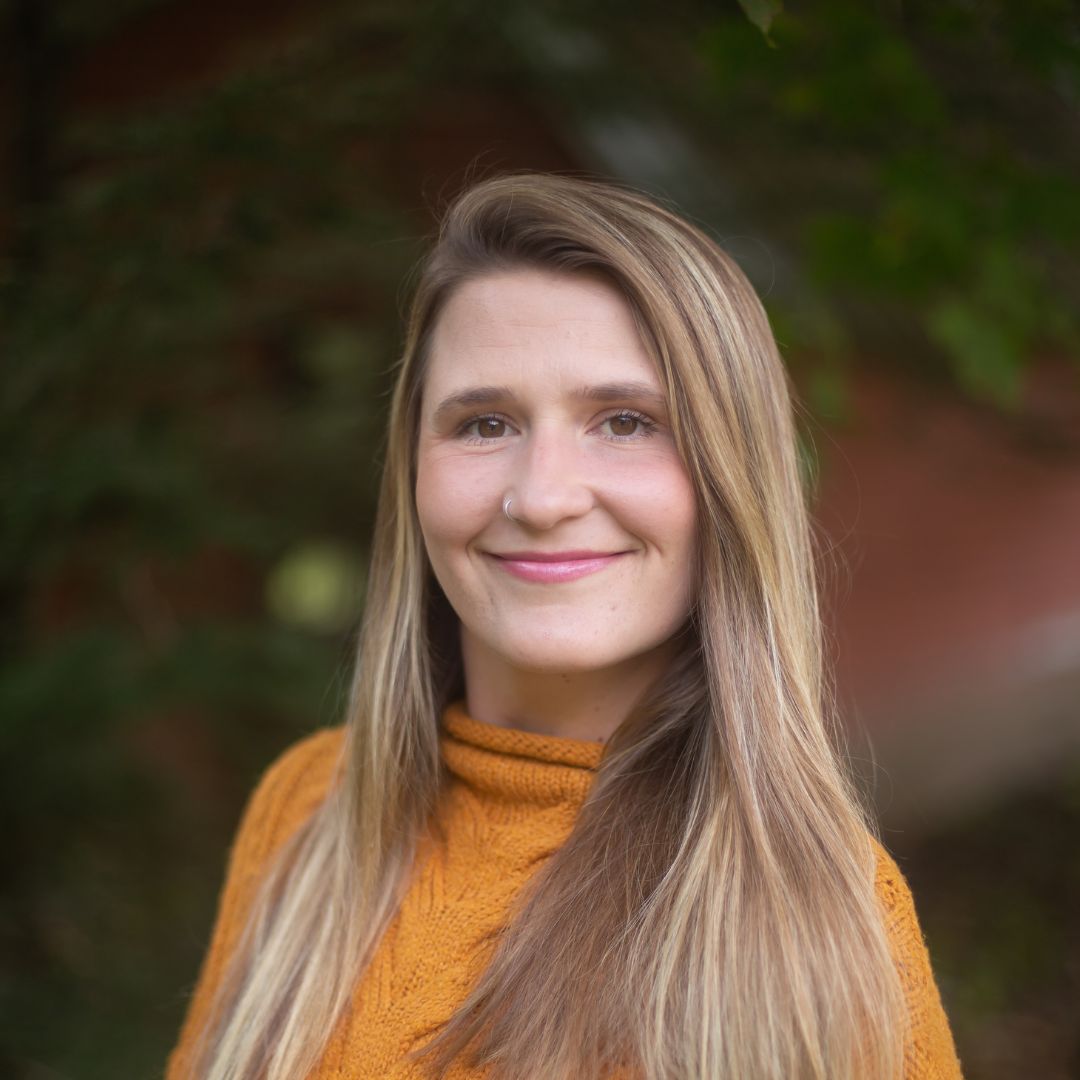
Program Directed by
If you have questions or would like to talk further about this program, please get in touch!




